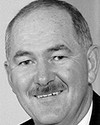Mr. Speaker, today I recognize the achievements of Brad Gushue, Mark Nichols, Brent Hamilton, Mike Adam, Jamie Korab and coach Jeff Thomas, the Canadian junior men's curling champions who went on to win the world junior men's curling championship in Ogden, Utah, on March 25.
Mark and Mike are from my Labrador riding. They will be showing their teammates a warm Labrador welcome on their victory tour this week. I congratulate them on a fine performance and extend to them my best wishes on behalf of all Labradorians.
Another Labrador west foursome, Keith Ryan, Garry Pinsent, Mike Ryan and Dennis Langdon, represented Newfoundland and Labrador at this year's senior men's brier.
Labrador west and the Carol Curling Club have always been hot spots for cool winter sports. With spirit and determination, our teams have overcome the distance and expense involved in competing at provincial, national and international levels.
On behalf of all members, I extend my congratulations to the boys for their world class curling achievements.














